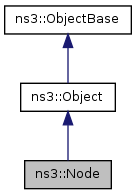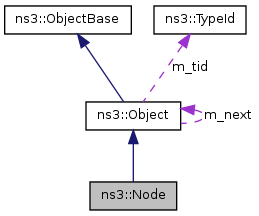#include <node.h>


Public Types | |
| typedef Callback< void, Ptr < NetDevice >, Ptr< const Packet >, uint16_t, const Address &, const Address &, NetDevice::PacketType > | ProtocolHandler |
Public Member Functions | |
| Node () | |
| Node (uint32_t systemId) | |
| uint32_t | GetId (void) const |
| uint32_t | GetSystemId (void) const |
| uint32_t | AddDevice (Ptr< NetDevice > device) |
| Ptr< NetDevice > | GetDevice (uint32_t index) const |
| uint32_t | GetNDevices (void) const |
| uint32_t | AddApplication (Ptr< Application > application) |
| Ptr< Application > | GetApplication (uint32_t index) const |
| uint32_t | GetNApplications (void) const |
| void | RegisterProtocolHandler (ProtocolHandler handler, uint16_t protocolType, Ptr< NetDevice > device, bool promiscuous=false) |
| void | UnregisterProtocolHandler (ProtocolHandler handler) |
Static Public Member Functions | |
| static TypeId | GetTypeId (void) |
| This method returns the TypeId associated to ns3::Node. | |
Protected Member Functions | |
| virtual void | DoDispose (void) |
Private Member Functions | |
| virtual void | NotifyDeviceAdded (Ptr< NetDevice > device) |
Detailed Description
A network Node.
This class holds together:
- a list of NetDevice objects which represent the network interfaces of this node which are connected to other Node instances through Channel instances.
- a list of Application objects which represent the userspace traffic generation applications which interact with the Node through the Socket API.
- a node Id: a unique per-node identifier.
- a system Id: a unique Id used for parallel simulations.
Every Node created is added to the NodeList automatically.
Member Typedef Documentation
| typedef Callback<void,Ptr<NetDevice>, Ptr<const Packet>,uint16_t,const Address &, const Address &, NetDevice::PacketType> ns3::Node::ProtocolHandler |
A protocol handler
- Parameters:
-
device a pointer to the net device which received the packet packet the packet received protocol the 16 bit protocol number associated with this packet. This protocol number is expected to be the same protocol number given to the Send method by the user on the sender side. sender the address of the sender receiver the address of the receiver; Note: this value is only valid for promiscuous mode protocol handlers. packetType type of packet received (broadcast/multicast/unicast/otherhost); Note: this value is only valid for promiscuous mode protocol handlers.
Constructor & Destructor Documentation
| ns3::Node::Node | ( | ) |
Must be invoked by subclasses only.
| ns3::Node::Node | ( | uint32_t | systemId | ) |
- Parameters:
-
systemId a unique integer used for parallel simulations.
Must be invoked by subclasses only.
Member Function Documentation
| uint32_t ns3::Node::AddApplication | ( | Ptr< Application > | application | ) |
- Parameters:
-
application Application to associate to this node.
- Returns:
- the index of the Application within the Node's list of Application.
Associated this Application to this Node. This method is called automatically from Application::Application so the user has little reasons to call this method directly.
| virtual void ns3::Node::DoDispose | ( | void | ) | [protected, virtual] |
The dispose method. Subclasses must override this method and must chain up to it by calling Node::DoDispose at the end of their own DoDispose method.
Reimplemented from ns3::Object.
| Ptr<Application> ns3::Node::GetApplication | ( | uint32_t | index | ) | const |
- Parameters:
-
index
- Returns:
- the application associated to this requested index within this Node.
| uint32_t ns3::Node::GetId | ( | void | ) | const |
| uint32_t ns3::Node::GetNApplications | ( | void | ) | const |
- Returns:
- the number of applications associated to this Node.
| uint32_t ns3::Node::GetNDevices | ( | void | ) | const |
| uint32_t ns3::Node::GetSystemId | ( | void | ) | const |
- Returns:
- the system id for parallel simulations associated to this node.
| static TypeId ns3::Node::GetTypeId | ( | void | ) | [static] |
This method returns the TypeId associated to ns3::Node.
This object is accessible through the following paths with Config::Set and Config::Connect:
- /NodeList/[i]
Attributes defined for this type:
-
DeviceList: The list of devices associated to this Node.
- Set with class: ns3::ObjectVectorValue
- Underlying type: ns3::Ptr< ns3::NetDevice >
- Flags: read
-
ApplicationList: The list of applications associated to this Node.
- Set with class: ns3::ObjectVectorValue
- Underlying type: ns3::Ptr< ns3::Application >
- Flags: read
-
Id: The id (unique integer) of this Node.
- Set with class: ns3::UintegerValue
- Underlying type: uint32_t 0:4294967295
- Flags: read
No TraceSources defined for this type.
Reimplemented from ns3::Object.
- Parameters:
-
device the device added to this Node.
This method is invoked whenever a user calls Node::AddDevice.
| void ns3::Node::RegisterProtocolHandler | ( | ProtocolHandler | handler, | |
| uint16_t | protocolType, | |||
| Ptr< NetDevice > | device, | |||
| bool | promiscuous = false | |||
| ) |
- Parameters:
-
handler the handler to register protocolType the type of protocol this handler is interested in. This protocol type is a so-called EtherType, as registered here: http://standards.ieee.org/regauth/ethertype/eth.txt the value zero is interpreted as matching all protocols. device the device attached to this handler. If the value is zero, the handler is attached to all devices on this node. promiscuous whether to register a promiscuous mode handler
| void ns3::Node::UnregisterProtocolHandler | ( | ProtocolHandler | handler | ) |
- Parameters:
-
handler the handler to unregister
After this call returns, the input handler will never be invoked anymore.
The documentation for this class was generated from the following files:
- src/node/node.h
- doc/introspected-doxygen.h
 1.7.1
1.7.1